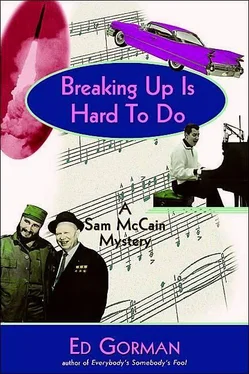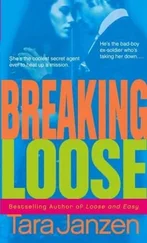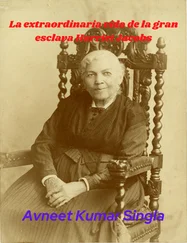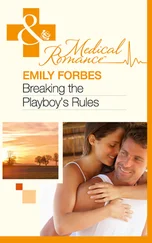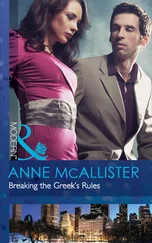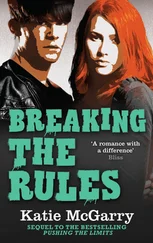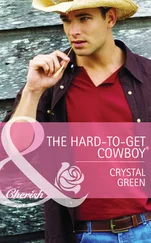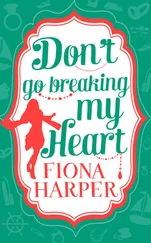“Why ‘stupid’?”
“Are you kidding? How long did they think before it’d get out?”
“You spent time with her.”
“Yeah, but I didn’t put her on the payroll.” Then: “Whether you noticed it or not, I’m scared shitless.”
It was one of those moments when somebody sort of forces you to like them against your better judgment.
“She was beautiful,” he said, “and I’d never had sex like that. Never once. Hell, I wasn’t even attractive to women until I got in my forties. I think it’s being bald. I’m not kidding you. I lose my hair, women suddenly start showing interest in me. I was always the best friend, the blind date, the guy who couldn’t get to first base when everybody else was hitting home runs. And then I lose my hair and women seem to like me.”
“Maybe it’s the ’vette.”
“I’ve thought of that, believe me. Or maybe it’s the combination.” He covered his face with his hands and took several deep breaths. A relaxing technique. He took his hands away and said, “Think the police’ll find out about me?”
“I don’t know. But I’d get a lawyer right away.”
“Are you serious?”
“Yeah. Right now this thing is spinning out of control. Not everybody was playing by the rules. She was seeing you and maybe a few others besides her benefactors. So I wouldn’t be surprised if a few more names get tossed into the ring. But I’d get a lawyer. I’d prepare for the worst.”
“If I can prove I didn’t kill her will my name come out?”
“In other words, can you make a deal with the cops? Probably. As long as you’ve got a damned good alibi. I think they can arrange to keep it quiet.”
“I was at a county medical board meeting the whole night. Then we ended up at this after-hours place. Sort of a dive. And I was with another doctor the whole time. Paul Kendrick. He had the car. I rode with him. I couldn’t have slipped away even if I’d wanted to.”
“Kendrick’ll vouch for you?”
“I’ll call him right now if you want me to.”
“I’ll take your word for it. The cops won’t.” Then: “One final thing. You ever see her upset—afraid, angry, anything like that—and couldn’t figure out why?”
He leaned back and gave it some thought. “Once, I guess. She kept looking out the window. She seemed agitated about something. I had the sense somebody was out there.”
“In a car, you mean?”
“I’m not sure. It’s just—she kept looking out the window and then she’d be very uptight for a while. Chewing her lip. Not paying attention to what I was saying. Chain smoking. I’d never seen her act that way.”
“Did you have any sense of her life outside of you?”
“That was the funny thing. No, I didn’t. She never mentioned another person or a job or even what she liked to do. And she was more worried about people seeing us out and about than I was. I’d ask her about it of course but she’d just laugh and say ‘I’m a mystery woman.’ And she wasn’t kidding.” A glance at the wrist watch. “I really should call a lawyer?”
I said, “You really should call a lawyer.”
I sat in my car with a Pepsi and some smokes listening to Ross Murdoch’s press conference. He made a brief statement announcing his resignation for “personal reasons” and said that he was very sorry for what this would do to his political party. He said he would take no questions and he meant it. He had already put a prominent criminal defense lawyer named Richard Spellman on the payroll. He was from Chicago and he was good. Spellman took the questions. I’d just heard the national news a few minutes earlier. Still no word from Russia. But their ships had yet to turn back. They were still churning toward the distant blockade.
I’d come out to the now-closed park for a long walk. The Murdoch story was so lurid that it had become more interesting to locals than the possibility of nuclear war.
I looked out at the river below. The last of the autumn’s motor boats raced up and down the blue water. The birches on the far shore looked white and clean and pure. Staggered up the hill were oaks and maples, peacock-splendid in their colors.
I shut off the radio and got out of the car for my walk. I took my pocket-sized spiral notebook along, flipping back through my notes as I went. I still hadn’t interviewed Peter Carlson, which I wasn’t looking forward to. I wasn’t sure I could even get to him. He would have hired a smart lawyer by now.
I walked ’till dusk. The cornfields were a dirty golden color now that the crop had been picked, the stalks like fallen soldiers.
On the drive back to town I thought about Mary and Pamela. My folks’ generation was the last to be dutiful mates. My generation was already setting records for divorces. Innumerable sociologists had already written innumerable tomes on the subject. I suppose it had something to do with how a lot of us had been raised. Virtually everything in our lives was disposable. Very little lasted very long—certainly not our cars, our appliances, our homes. So we got new ones. Why should spouses be any different? There were plenty of those around, too.
On the way home, because of a commercial on the radio, I figured out how Karen Hastings’ body might have been carried into Ross Murdoch’s house.
“You like?” Stu said.
He wore an apron that said Master Chef on it. It had a silly suburban face right below the script. You throw everything in a suitcase as you make a desperate trip to find your gone-fled wife and you make sure to pack your Master Chef apron?
“Doesn’t Stu sound Chinese when he says that?” Pamela laughed.
“Oh, yes, very Chinese,” I said.
“‘You like?’” she said. “He’s so cute.”
“Downright adorable,” I said.
“So you haven’t told me, Sam,” Stu said, seating himself. “How’s the steak?”
“Great.” And it was. Stu truly was a Master Chef.
We were eating steaks on my wobbly dining room table. Stu was playing a Pat Boone album—my God, he must’ve packed that, too—and Pamela was wearing some kind of Kabuki robe. Stu spoke Chinese and she wore Kabuki. An international couple.
“We’re really starting to like your little apartment,” Stu said. “I haven’t lived in a place like this since college. I had a little more room and it was a little nicer but this is growing on me.”
“Growing,” I said.
“Stu is even getting used to the kitty litter box.”
“It’s pretty darned unsanitary,” he said, “when you come right down to it. But I want to keep my pumpkin happy. She loves cats. I’m a dog man, myself. They go outside when they want to go number two. Well, or number one for that matter.”
“In case you haven’t noticed,” Pamela said, “we’ve decided to stay married.”
“Gee,” I said, “there’s good news.”
“We’re going to buy a new house when we get back to Chicago.”
“And a new car.”
“We owe you a lot, Sam,” Stu said, “you know, letting us stay in your little apartment like this.”
Pamela smiled. “Even with the kitty litter, hon?” She had pieces of steak in her teeth.
Stu was one of those guys—like Red Skelton—who always signaled when he was about to tell a joke. He laughed right before delivering it. “You know what I told Pumpkin here—I’m just glad I don’t have to use a kitty litter box when I want to go to the bathroom.”
Pamela covered her mouth with a napkin, she was laughing so hard. “God, what a picture that would make. Stu and a kitty litter box.”
“I really do enjoy it here in your little apartment,” Stu said. “It really is just like being back in college again.”
“Same with me, Sam. I took a bubble bath this afternoon. I stayed in there for two hours. Nobody knows we’re here. It’s sort of like hiding out.”
Читать дальше
